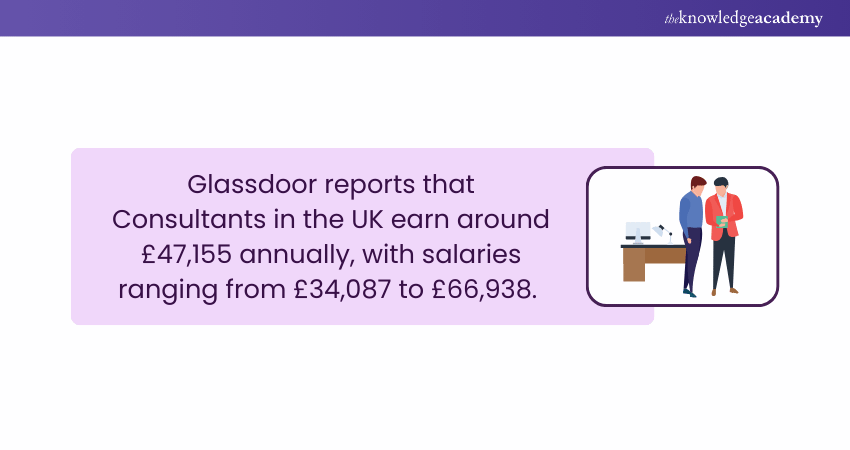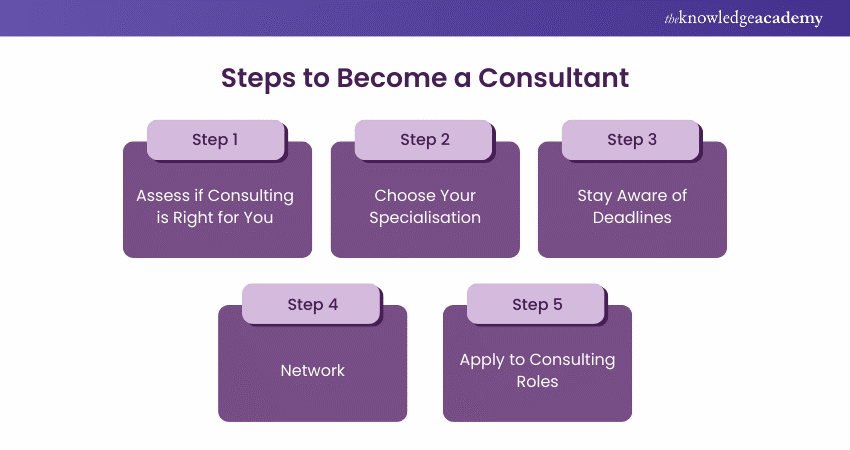We may not have the course you’re looking for. If you enquire or give us a call on +44 1344 203999 and speak to our training experts, we may still be able to help with your training requirements.
Training Outcomes Within Your Budget!
We ensure quality, budget-alignment, and timely delivery by our expert instructors.

Imagine being the problem-solver that businesses turn to when they're stuck in a dilemma, unable to make the right decision. That’s exactly what a Consultant does—bringing expertise, fresh perspectives, and strategic thinking to the table. But What is Consulting? Consulting is more than simply giving advice; it’s about reshaping entire organisations, improving efficiencies, and driving results across industries like finance, IT, marketing, and more.
As a career, Consulting offers a blend of problem-solving, strategy, and dynamic work environments, appealing to professionals who thrive on variety and challenge. But what exactly does a Consultant do, and what are the benefits and drawbacks of pursuing this path? Let’s explore What is Consulting and whether it's the right career choice for you.
Table of Contents
1) What is Consulting?
2) What do Consultants do?
3) What Types of Companies Hire Consultants?
4) Advantages of Having Consulting as a Career
5) Disadvantages of Having Consulting as a career
6) How to Become a Consultant?
7) Conclusion
What is Consulting?
Consulting involves providing expert advice to businesses, organisations, or individuals to help them solve complex problems, improve performance, or achieve specific goals. Consultants offer specialised knowledge, skills, and an external perspective to address challenges in various industries, including finance, marketing, operations, and IT.

Consulting can range from offering strategic guidance to implementing solutions directly within an organisation. Consultants can work on their own or as part of a Consulting firm, or within a company as internal Consultants. The goal is to enhance Decision Making, efficiency, and overall success by harnessing their expertise and insights.
What do Consultants do?
Consultants play a critical role in problem-solving and decision making within organisations. They use their expertise to assess situations, identify issues, and recommend actionable solutions. Below are some key activities that Consultants typically engage in:
1) Consultants Define the Problem
One of the primary roles of a Consultant is to define the problem accurately. This involves understanding the client's needs, identifying underlying issues, and clarifying the scope of the project. Consultants conduct initial assessments through interviews, surveys, and workshops with stakeholders.
Defining the problem correctly is crucial, as it sets the stage for the entire Consulting process, ensuring that the right solutions are developed to address the core issues.
2) Consultants Collect and Analyse Data
After defining the problem, Consultants collect and analyse relevant data to understand the situation thoroughly. This process may involve reviewing company records, conducting market research, and benchmarking against industry standards.
The goal is to gather insights that reveal patterns, root causes, and areas for improvement. Data Analysis helps Consultants make informed recommendations and provides evidence to support their proposed solutions, ensuring they are grounded in factual, real-world information.
3) Consultants Recommend a Course of Action
Based on their analysis, Consultants recommend specific actions or strategies to address the identified problems. These recommendations are tailored to the client’s unique needs and are often accompanied by detailed plans, timelines, and projected outcomes.
Consultants ensure that their suggestions are practical, achievable, and aligned with the client’s overall goals. Presenting clear, actionable recommendations is a key deliverable in Consulting, empowering clients to make informed decisions.
4) Consultants Help to Gain Consensus Around the Solution
Consultants also facilitate discussions among stakeholders to build consensus around the proposed solutions. This involves presenting findings, addressing concerns, and aligning different perspectives within the organisation.
Consultants use their communication and negotiation skills to ensure that everyone understands and supports the recommended course of action. Achieving consensus is crucial for the successful implementation of any strategy, as it fosters collaboration and commitment across the organisation.
5) Consultants Help Implement Recommendations
In addition to providing advice, Consultants often play an active role in implementing their recommendations. This may include managing projects, training staff, or guiding the organisation through Change Management Processes.
Consultants work closely with the client to make sure the solutions are executed effectively and deliver the desired results. Their involvement in implementation helps bridge the gap between planning and action, increasing the likelihood of successful outcomes.
What Types of Companies Hire Consultants?
Various types of companies hire Consultants to leverage external expertise and enhance their operations. Large corporations often hire Consultants to assist with strategy, mergers, and restructuring efforts. Small and Medium-sized Enterprises (SMEs) seek Consultants to improve efficiency, scale their business, or navigate complex challenges.

Non-profits and government agencies also use Consultants to optimise processes and address specific issues. Consulting firms, from global giants like McKinsey and BCG to boutique agencies, serve clients across industries, providing tailored solutions to meet diverse needs.
Advantages of Having Consulting as a Career
Consulting offers numerous advantages, making it an attractive career choice for many professionals:
a) Diverse Work Experience: Consultants work with various industries and clients, gaining exposure to different business challenges and strategies.
b) Skill Development: The role sharpens problem-solving, communication, and analytical skills, providing a strong foundation for future leadership roles.
c) High Earning Potential: Consulting is a lucrative field with competitive salaries, performance bonuses, and opportunities for rapid career advancement.
d) Networking Opportunities: Consultants build a vast network of industry contacts, opening doors to new possibilities and professional growth.
e) Travel and Flexibility: Many Consulting roles offer travel opportunities and flexible work arrangements, appealing to those who enjoy dynamic work environments.
Improve your Leadership skills and drive organisational success with our comprehensive Management Courses – Sign up now!
Disadvantages of Having Consulting as a Career
Despite its appeal, Consulting also comes with challenges:
a) Long Hours: Consultants often work extended hours, particularly during project deadlines, which can impact work-life balance.
b) High Stress Levels: The pressure to deliver results, manage client expectations, and meet tight deadlines can lead to stress and burnout.
c) Frequent Travel: Travel requirements can be demanding, leading to time away from home and fatigue.
d) Job Security: Consulting roles can be project-based, leading to uncertainty between assignments, especially for freelancers or smaller firms.
e) Client Dependency: Consultants must continually manage relationships and prove their value to secure ongoing or future work, which can be unpredictable.
How to Become a Consultant?
Becoming a Consultant involves a combination of skills, education, and strategic planning:

Ask Yourself Whether Consulting is Right for You
Consider whether you enjoy problem-solving, working in dynamic environments, and handling diverse challenges. Consulting requires adaptability, resilience, and a passion for continuous learning.
Identify Your Area of Interest or Expertise
Determine the field you want to specialise in, such as IT, marketing, finance or Management Consulting. Developing expertise in a specific niche enhances your credibility and value as a Consultant.
Check for Early Deadlines
Consulting firms often have early application deadlines, especially for internships and entry-level positions. Staying informed about these timelines ensures you don’t miss out on opportunities.
Network
Networking is vital in Consulting. Attending industry events, connecting with professionals on LinkedIn, and joining relevant groups to build relationships and learn about job openings.
Apply
Apply to Consulting roles that match your skills and interests. Tailor your CV and cover letter to showcase relevant experience, problem-solving skills, and achievements that demonstrate your Consulting potential.
Conclusion
Understanding What is Consulting reveals it as a rewarding yet challenging career, offering diverse opportunities to make a meaningful impact across industries. By evaluating the nature of Consulting, its pros and cons, and taking strategic steps to enter the field, aspiring Consultants can build successful careers. Whether helping organisations define problems, analyse data, or implement solutions, Consultants play a vital role in driving business success growth.
Looking to sharpen your Consulting skills? Explore our Consulting Skills Training and enhance your expertise.
Frequently Asked Questions

The Big 4 Consulting firms are Deloitte, PwC, EY, and KPMG. They are globally recognised for providing audit, Consulting, tax and advisory services across various industries and are known for their extensive expertise and influence.

Consulting firms provide expert advice to help businesses solve problems, improve efficiency, and achieve strategic goals. They offer services such as strategy development, operational improvement, financial Consulting, and technology solutions, working closely with clients to deliver impactful results.

The Knowledge Academy takes global learning to new heights, offering over 30,000 online courses across 490+ locations in 220 countries. This expansive reach ensures accessibility and convenience for learners worldwide.
Alongside our diverse Online Course Catalogue, encompassing 19 major categories, we go the extra mile by providing a plethora of free educational Online Resources like News updates, Blogs, videos, webinars, and interview questions. Tailoring learning experiences further, professionals can maximise value with customisable Course Bundles of TKA.

The Knowledge Academy’s Knowledge Pass, a prepaid voucher, adds another layer of flexibility, allowing course bookings over a 12-month period. Join us on a journey where education knows no bounds.

The Knowledge Academy offers various Management Courses, including Consulting Skills Training, Introduction to Management and Senior Management Training. These courses cater to different skill levels, providing comprehensive insights into Management Consulting.
Our Business Skills Blogs cover a range of topics related to Consulting, offering valuable resources, best practices, and industry insights. Whether you are a beginner or looking to advance your Consulting skills, The Knowledge Academy's diverse courses and informative blogs have got you covered.
Upcoming Business Skills Resources Batches & Dates
Date
 Consulting Skills Training
Consulting Skills Training
Fri 7th Feb 2025
Fri 4th Apr 2025
Fri 6th Jun 2025
Fri 8th Aug 2025
Fri 3rd Oct 2025
Fri 5th Dec 2025







 Top Rated Course
Top Rated Course



 If you wish to make any changes to your course, please
If you wish to make any changes to your course, please


